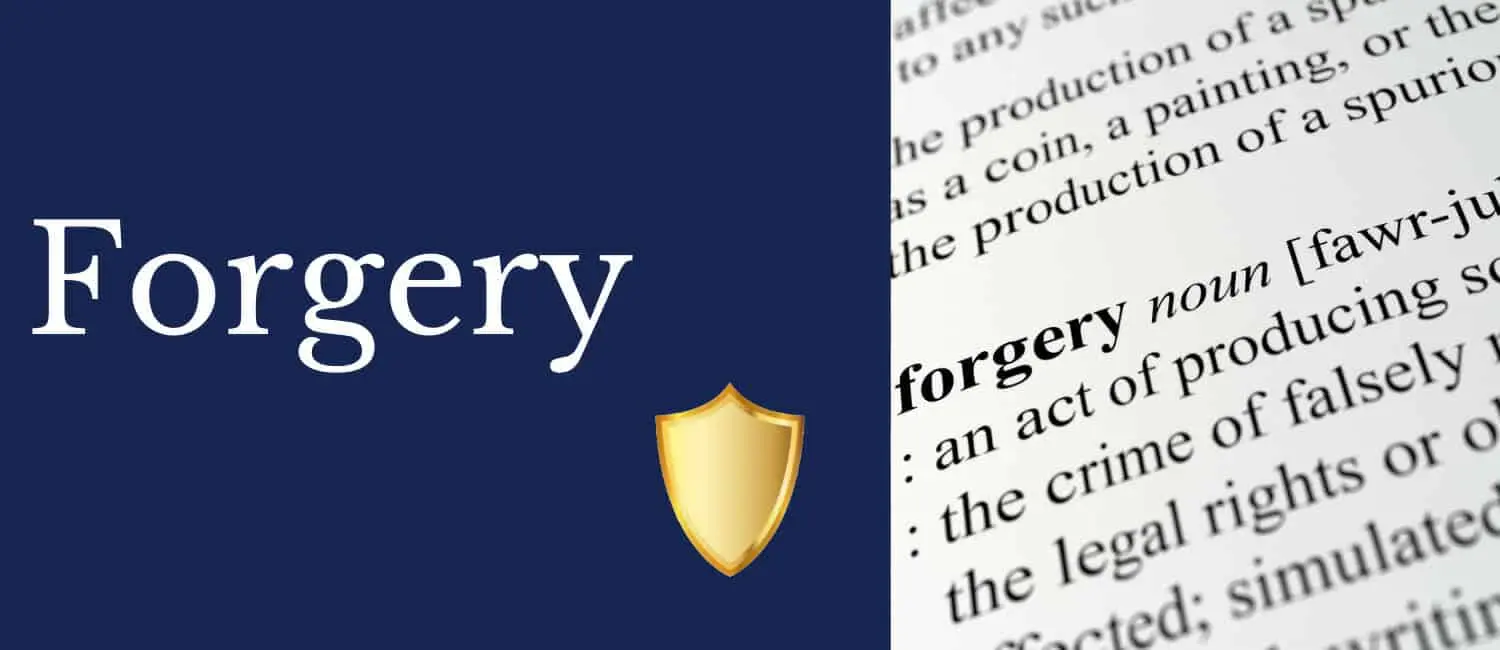
Both forgery and fraud are illegal acts punishable by the laws of Texas.
Punishment can include a monetary fine along with prison time for felony offenses.
Believe it or not, forgery is actually a specific type of fraud.
There are several types of forgery:
- Signing and using a check that belongs to another party.
- Using a false name to sign a document.
- Preparing and distributing a false document.
- Making alterations to amounts, times or even dates on an official document.
Forgery is a serious crime in Texas and the punishment can include both monetary fines and time in prison.
If you have been accused of a forgery crime, Blizzard and Zimmerman Attorneys can vigorously defend you.
Contact us today for a one-on-one consultation with one of our experienced criminal defense lawyers.
The Texas Penal Code defines forgery as:
- a person forges a writing with intent to defraud or harm another person.
Writing is defined as:
- Printing or any other method of recording information
- Money, coins, tokens, stamps, seals, credit cards, badges, and trademarks; and
- Symbols of value, right, privilege, or identification.
The penalties for forgery here in Texas do vary:
A specific act of forgery can be classified as a Class A misdemeanor, which can result in 1 year in jail and a $4,000 fine.
However, if the writing is or purports to be a will, codicil, deed, deed of trust, mortgage, security instrument, security agreement, credit card, check, authorization to debit an account at a financial institution, or similar sight order for payment of money, contract, release, or other commercial instrument, it is classified as a state jail felony, which can result in 180 days – 2 years in jail, and a $10,000 fine.
If the writing is or purports to be:
- Part of an issue of money, securities, postage or revenue stamps;
- A government record listed in Section 37.01(2)(C); or
- Other instruments issued by a state or national government or by a subdivision of either, or part of an issue of stock, bonds, or other instruments representing interests in or claims against another person.
It is classified as a third-degree felony, which can result in 2-10 years in prison, and a $10,000 fine.
If it is shown on the trial that the actor engaged in the conduct to obtain or attempt to obtain a property or service, the charge is:
- A Class C misdemeanor ($500 fine) if the value of the property or service is less than $100;
- A Class B misdemeanor (180 days in jail, and a $2,000 fine) if the value of the property or service is $100 or more but less than $750;
- A Class A misdemeanor (1 year in jail, and a $4,000 fine) if the value of the property or service is $750 or more but less than $2,500;
- A state jail felony (180 days – 2 years in jail, and a $10,000 fine) if the value of the property or service is $2,500 or more but less than $30,000;
- A felony of the third degree (2-10 years in prison, and a $10,000 fine) if the value of the property or service is $30,000 or more but less than $150,000;
- A felony of the second degree (2-20 years in prison, and a $10,000 fine) if the value of the property or service is $150,000 or more but less than $300,000; and
- A felony of the first degree (5-99 years/life in prison, and a $10,000 fine) if the value of the property or service is $300,000 or more.
The classification of the charge will raise one level if the fraud was committed against an elderly individual.
To discuss a state or federal felony criminal forgery investigation, arrest, charge, or conviction with a criminal defense lawyer that serves the Abilene, TX area contact Blizzard & Zimmerman Attorneys.
Learn how our lawyers at Blizzard & Zimmerman Attorneys can protect your rights and fight for your freedom during a consultation with our lawyers, not just meeting with a staff member or law clerk. Contact us today.[/column]

